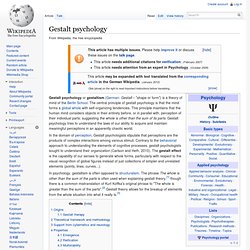

Parte 2ª. Jorge Bucay en Ratones Coloraos. Parte 1ª. Jorge Bucay en Ratones Coloraos. Gestalt therapy. Gestalt therapy is an existential/experiential form of psychotherapy that emphasizes personal responsibility, and that focuses upon the individual's experience in the present moment, the therapist-client relationship, the environmental and social contexts of a person's life, and the self-regulating adjustments people make as a result of their overall situation.

§Overview[edit] Edwin Nevis described Gestalt therapy as "a conceptual and methodological base from which helping professionals can craft their practice".[1] In the same volume Joel Latner stated that Gestalt therapy is built upon two central ideas: that the most helpful focus of psychotherapy is the experiential present moment, and that everyone is caught in webs of relationships; thus, it is only possible to know ourselves against the background of our relationship to the other.[2] The historical development of Gestalt therapy (described below) discloses the influences that generated these two ideas. §Experimental freedom[edit] Gestalt psychology. Gestalt psychology or gestaltism (German: Gestalt – "shape or form") is a theory of mind of the Berlin School.

The central principle of gestalt psychology is that the mind forms a global whole with self-organizing tendencies. This principle maintains that the human mind considers objects in their entirety before, or in parallel with, perception of their individual parts; suggesting the whole is other than the sum of its parts.